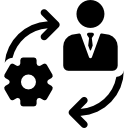Computers in a networked world: Difference between revisions
Mr. MacKenty (talk | contribs) No edit summary |
Mr. MacKenty (talk | contribs) (→Roles) |
||
| Line 5: | Line 5: | ||
== Roles == | == Roles == | ||
Roles include client, server, email server, DNS server, router and firewall. | Roles can include client, server, email server, DNS server, DHCP server, router and firewall. | ||
{| style="width: 95%;" class="wikitable" | {| style="width: 95%;" class="wikitable" | ||
| Line 23: | Line 23: | ||
| '''Firewall''' || foo | | '''Firewall''' || foo | ||
|} | |} | ||
== Real-world practical advice == | == Real-world practical advice == | ||
Revision as of 15:46, 8 January 2017

System Fundamentals[1]
A computer can have different roles when we think about networks. You can think of a role as a "service a computer provides". Computers can provide multiple services, and can be both a client and provide a service.
Roles[edit]
Roles can include client, server, email server, DNS server, DHCP server, router and firewall.
| Role | Description |
| Client | foo |
| Server | foo |
| DNS server | foo |
| DHCP server | foo |
| Router | foo |
| Firewall | foo |
Real-world practical advice[edit]
If you work with any professional computer scientist or IT professional, they will assume you understand the different roles a computer can have in a networked world. This is pretty basic stuff, so please memorize it.
Do you understand this material?[edit]
You should be able to provide 2 or 3 examples for each of the above terms.
Standards[edit]
- Describe the roles that a computer can take in a networked world.